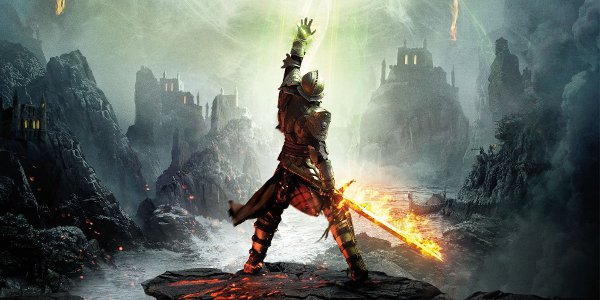
BioWare learned its lesson from Dragon Age 2. They make this point as early as Dragon Age: Inquisition's character creation. Your choices are no longer limited to male Hawke or female Hawke. You can become a human, elf, dwarf, or qunari and then tweak every little physical detail of this hero. The custom introduction missions of Dragon Age: Origins haven't returned but BioWare's bringing the series back to its original vision of player-driven fantasy adventures.
Inquisition departs from past games by putting you in control of an entire organization. Your keep acts as the main hub of the game, where you shop for new equipment or chat with followers. There's a simple thrill to seeing this understaffed keep slowly come to life over the course of the campaign. It's a vivid way of reminding the player that they're growing in power and that they've come a long way from their humble beginnings.
Talking with your travel companions at base is one of the best uses of your time. One of the main incentives for progressing in the campaign for me was that it would unlock new conversation topics with my allies. These interactions are where you really appreciate the writing skills of BioWare. Characters that seem like walking cliches at first (the aloof mage, the meathead warrior) end up being much deeper than expected. Peeling back the layers of these heroes is as gratifying as anything else you'll do.
From your war room, you can send out your forces on missions. You could send soldiers to scout a new location, enabling you to then travel there and explore it personally. Other missions, like sending diplomats to a nearby lord or assigning soldiers to find missing comrades, aren't mandatory but provide rewards like gold or items. The missions proceed in real-time even if you're not playing Inquisition.
These quests provide tangible benefits to your character and their party. I never felt very satisfied by them, though. If I send my soldiers to find a treasure, I'm just basically telling the game, "Give me gold in an hour." There's no strategy to work out; you choose between sending your soldiers, spies, or diplomats and then they complete it in the specified amount of time. Choosing a force that's less suited to a task (i.e. sending soldiers for a diplomatic mission) takes a bit longer but you'll know that beforehand. There's no uncertainty or risk of failure. With nothing at stake, the rewards felt hollow.
Going out on adventures yourself is, thankfully, is more fun. BioWare, admittedly influenced by SkyrimQ, made Inquisition much more open-ended than previous Dragon Age games. Players can now roam massive countrysides filled with side quests. These quests are a mixed bunch, padded with a lot of MMO-like "kill x enemies or "fetch y items" tedium. Somehow these tasks ended up being more fun than they ought to be, though, perhaps due to how gorgeous the landscapes are. I found myself in the familiar trance of Skyrim at times, bouncing from one quest marker to the next on my way to visit some distant landmark.
The combat, meanwhile, has been improved a lot from Dragon Age 2. BioWare brought back the tactical, bird's-eye view for the camera so players can coordinate your party's actions more. You can pause the action and queue up character's movements or actions. The extent to which you'll need to do this depends on the difficulty level, though. On lower settings, you can spend most of your time just controlling your own character in real-time, only switching to companions to drink a potion. The customizable A.I. of the companions works well enough that they'll manage on their own. Players who want protracted, strategic battles can get them on higher difficulty while the folks looking to just blaze through it so they can advance the story will be satisfied by the easier levels.
Your Daily Blend of Entertainment News
The removal of healing spells from past games caused some controversy before Inquisition's launch. This doesn't seem to have dumbed down the combat at all, though. For actual health replenishment, you have to rely on a finite supply of potions that can only be replenished at base camps sprinkled throughout the world. Your party members don't regenerate health after combat. What this does is make your performance in each battle important; if your party gets roughed up in a battle, your next fight will be all the more difficult. You'll have to rely more and more on protective spells that prop up your dwindling health.
The combat is front and center in the new four player co-op mode. Each player controls a different character in a 30-minute dungeon crawl. The dungeon's five parts are chosen at random, giving some variety and surprise to each adventure. Players can choose from 12 characters, each with their upgradeable equipment and abilities.
You may get a few more hours of enjoyment out of this mode. The multiplayer never took hold of me, though. After controlling an entire party in Inquisition's campaign, being limited to only one character felt like a step down. Character progression, meanwhile, feels too slow to distract from the grind of running similar dungeons over and over. This slow upgrade process is, of course, by design: how else would they get us to spend real-world money to speed it up?
The lack of a wider purpose for the co-op hurts, too. I would've stuck with it longer had these adventures impacted the campaign in even a small way. However, while the co-op takes place in roughly the same time period as the single-player, there's a concrete wall between the two. Your campaign play-through won't benefit at all from your co-op progress. I understand that BioWare didn't want to make the multiplayer feel mandatory like Mass Effect 3's but they could have found a way to make it at least meaningful.
BioWare never seemed very confident with their vision of Dragon Age. With each new game, they've rethought basics like the combat, structure and visuals. Inquisition may be the last time BioWare has to reinvent the series, though. It's not perfect but BioWare has created a solid foundation that could endure for several sequels to come.
Platforms: Xbox One (reviewed), PS4, PC, Xbox 360, PS3
Developer: BioWare
Publisher: Electronic Arts
ESRB: Mature
Rating:

Staff Writer at CinemaBlend.

